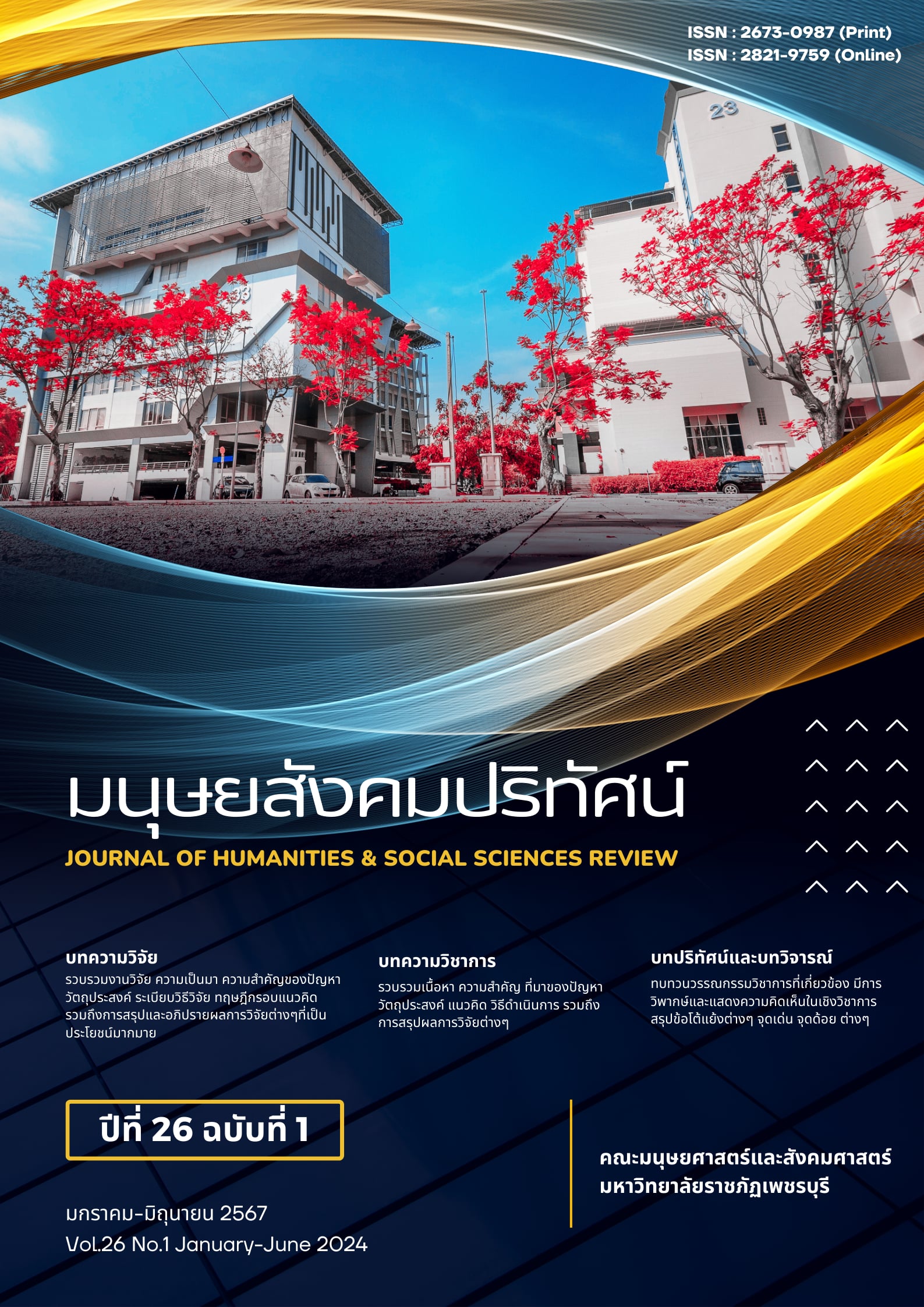การพัฒนาการเรียนการสอนรายวิชาอนามัยสิ่งแวดล้อมโดยการใช้แนวคิดมหาวิทยาลัยสีเขียวเป็นฐาน : กรณีศึกษาการสุขาภิบาลอาหาร
Main Article Content
บทคัดย่อ
งานวิจัย เรื่องการพัฒนาการเรียนการสอนรายวิชาอนามัยสิ่งแวดล้อมโดยการใช้แนวคิดมหาวิทยาลัยสีเขียวเป็นฐาน: กรณีศึกษาสุขาภิบาลอาหาร ทำการศึกษากับนักศึกษาชั้นปีที่ 2 สาขาวิชาสาธารณสุขศาสตร์ คณะพยาบาลศาสตร์และวิทยาการสุขภาพ มหาวิทยาลัยราชภัฏเพชรบุรี ที่เรียนในรายวิชาอนามัยสิ่งแวดล้อม (09882406) ภาคการศึกษาที่ 2/2563 จำนวน 29 คน โดยการสุ่มแบบคัดเลือก (Purposive sampling) โดยวัตถุประสงค์การวิจัยเพื่อ 1) ศึกษาความรู้ ความเข้าใจการมีส่วนร่วมของนักศึกษาภายใต้โครงการพัฒนามหาวิทยาลัยสีเขียวผ่านการเรียนการสอนในรายวิชาวิชาอนามัยสิ่งแวดล้อมด้านการสุขาภิบาลอาหารในโรงอาหารมหาวิทยาลัยราชภัฏเพชรบุรี 2) เปรียบเทียบการใช้แผนการพัฒนา การเรียนการสอนในรายวิชาอนามัยสิ่งแวดล้อมก่อนและหลังการใช้แผนการพัฒนาการเรียนการสอน และ 3) เสนอแนะแนวทางการพัฒนาโรงอาหารของมหาวิทยาลัยราชภัฏเพชรบุรีภายใต้โครงการพัฒนามหาวิทยาลัยสีเขียว เครื่องมือที่ใช้ในการวิจัย ได้แก่ (1) แบบทดสอบความรู้ในรายวิชาวิชาอนามัยสิ่งแวดล้อม เรื่อง การสุขาภิบาลอาหาร (2) แผนการพัฒนาการเรียนการสอน และกิจกรรมการเรียนการสอนในรายวิชาอนามัยสิ่งแวดล้อม เรื่อง การสุขาภิบาลอาหารซึ่งเน้นการประยุกต์ใช้มาตรการ 2R 3G 4L และ (3) สอบถามความคิดเห็นของกลุ่มตัวอย่างเกี่ยวกับแผนการพัฒนาการเรียนการสอน และกิจกรรมการเรียนการสอนในรายวิชาอนามัยสิ่งแวดล้อม เรื่อง การสุขาภิบาลอาหาร ซึ่งเน้นการประยุกต์ใช้มาตรการ 2R 3 G 4L ผลการศึกษาพบว่า 1) ค่าความแตกต่างของค่าเฉลี่ยแต่ละคนที่ทดสอบก่อน (pre-test) และหลัง (post-test) การใช้แผนการพัฒนาการเรียนการสอนในรายวิชาอนามัยสิ่งแวดล้อม มีค่าเฉลี่ยแตกต่างกันอย่างมีนัยสำคัญทางสถิติที่ระดับ 0.05 (P value < 0.05) แสดงให้เห็นว่านักศึกษามีความเข้าใจในรายละเอียดของรายวิชาอนามัยสิ่งแวดล้อม ตามมาตรการ 4L ในแนวทางสู่การเป็นมหาวิทยาลัยสีเขียว 2) แผนการพัฒนาการเรียนการสอนในรายวิชาอนามัยสิ่งแวดล้อม มีประสิทธิภาพของกระบวนการ (E1) ต่อประสิทธิภาพของผลลัพธ์ (E2) เท่ากับ 62.07/78.97 และ 3) นักศึกษามีความคิดเห็นเกี่ยวกับกิจกรรมการเรียนการสอนโดยใช้แผนการพัฒนาการเรียนการสอนในรายวิชาอนามัยสิ่งแวดล้อม ด้านการสุขาภิบาลอาหาร และด้านสถานที่ปรุงอาหาร ภาชนะที่บรรจุอาหาร ผู้สัมผัสอาหาร แมลงและสัตว์นำโรค ตามมาตรการ 2R 3G 4L สู่การเป็นมหาวิทยาลัยสีเขียว ทำให้กลุ่มตัวอย่างมีความรู้ ความเข้าใจอยู่ในระดับสูง ทั้งนี้ผลที่ได้จากกิจกรรมการเรียนการสอนใช้เพื่อเสนอแนะแนวทางสู่การเป็นมหาวิทยาลัยสีเขียวของมหาวิทยาลัยราชภัฏเพชรบุรีต่อไป
Article Details
1. มุมมองและความคิดเห็นใด ๆ ในบทความเป็นมุมมองของผู้เขียน คณะบรรณาธิการไม่จำเป็นต้องเห็นด้วยกับมุมมองเหล่านั้นและไม่ถือเป็นความรับผิดชอบของคณะบรรณาธิการ ในกรณีที่มีการฟ้องร้องเกี่ยวกับการละเมิดลิขสิทธิ์ ให้ถือเป็นความรับผิดชอบของผู้เขียน แต่เพียงผู้เดียว
2. ลิขสิทธิ์บทความที่เป็นของคณะมนุษยศาสตร์และสังคมศาสตร์ มหาวิทยาลัยราชภัฏเพชรบุรีมีลิขสิทธิ์ถูกต้องตามกฎหมาย การเผยแพร่จะต้องได้รับอนุญาตโดยตรงจากผู้เขียนและมหาวิทยาลัยราชภัฏเพชรบุรีเป็นลายลักษณ์อักษร
เอกสารอ้างอิง
จตุพร พงศ์พีระ. (2560). สาระวิชาหลักและทักษะเพื่อการดำรงชีวิตในศตวรรษที่ 21 สู่ (ร่าง) โครงสร้าง หลักสูตรการศึกษาขั้นพื้นฐานฉบับใหม่. บทความทักษะแห่งศตวรรษที่ 21 นิสิตปริญญาเอก สาขาหลักสูตรและการสอน รุ่น 5 มหาวิทยาลัยมหาสารคาม.
ดวงรัตน์ เสือขำ. (2561). การสุขาภิบาลอาหาร. สาขาวิชาอาชีวอนามัยและความปลอดภัย คณะวิทยาศาสตร์และเทคโนโลยี มหาวิทยาลัยราชภัฏนครปฐม.
ทิศนา แขมมณี. (2556). รูปแบบการเรียนการสอน : ทางเลือกที่หลากหลาย (พิมพ์ครั้งที่ 8). กรุงเทพฯ: จุฬาลงกรณ์มหาวิทยาลัย.
นฤมล ภูสิงห์. (2558). การพัฒนารูปแบบการเรียนการสอนเพื่อส่งเสริมความสามารถในการคิดอย่างมี วิจารณญาณสำหรับนักศึกษาวิชาชีพครู. วิทยานิพนธ์ครุศาสตรดุษฎีบัณฑิต สาขาวิชาหลักสูตรและการเรียนการสอน คณะครุศาสตร์ มหาวิทยาลัยราชภัฏมหาสารคาม.
อลิศรา ชูชาติ. (2545). การเรียนรู้แบบมีส่วนร่วมในการจัดการเรียนการสอนเกี่ยวกับสิ่งแวดล้อมประมวลบทความนวัตกรรมการเรียนรู้สำหรับครูปฏิรูปการศึกษา เล่ม 1. กรุงเทพฯ : จุฬาลงกรณ์มหาวิทยาลัย.
UI Green Metric. (2017). การจัดอันดับมหาวิทยาลัยสีเขียวโลก ยูไอ กรีนเมตริก. สืบค้นเมื่อ 20 ธันวาคม 2566, จาก http://www.greenmetric.ui.ac.id/.


